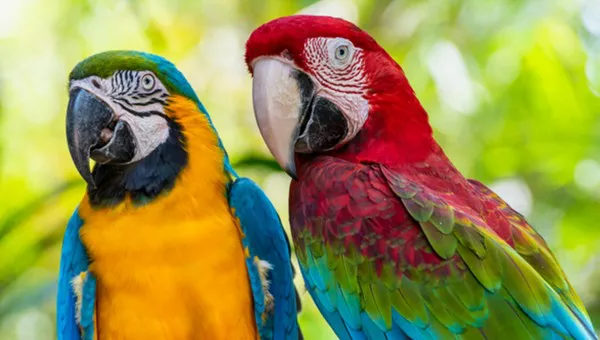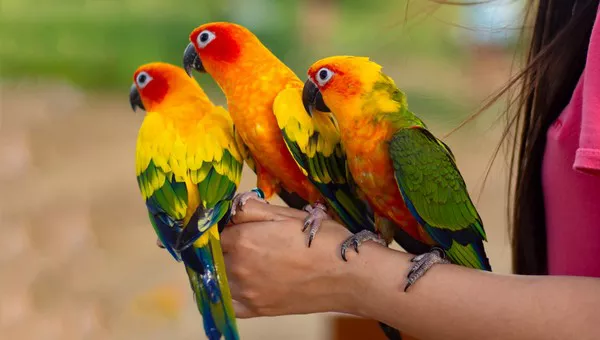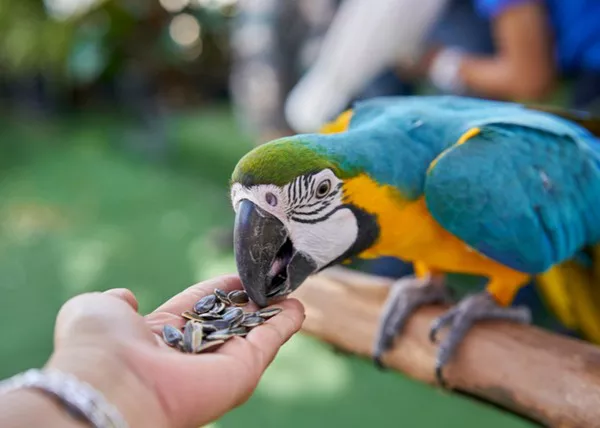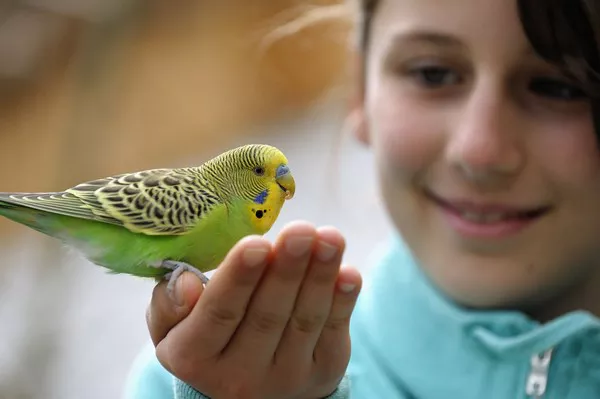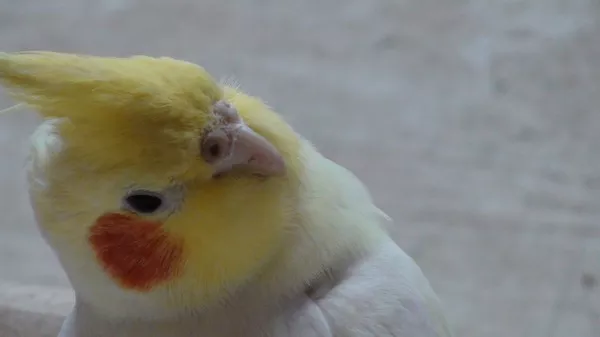Sun conures, also known as sun parakeets, are vibrant and affectionate birds that have gained popularity as pets. Their colorful plumage, playful behavior, and sociable nature make them a favorite among bird enthusiasts. If you’re considering adding a sun conure to your family or already have one, you may wonder about their growth and development stages. This article will explore when sun conures are considered full grown, their growth stages, care requirements, and behavioral characteristics.
Understanding Sun Conures
Sun conures are medium-sized parrots native to northeastern South America. They belong to the Aratinga genus and are known for their striking yellow and orange feathers, accented with green and blue markings. Adult sun conures typically weigh between 100 to 120 grams and measure about 12 to 14 inches in length.
Lifespan
Sun conures have a relatively long lifespan for birds, often living between 15 to 30 years in captivity. Proper care, a balanced diet, and a stimulating environment can significantly influence their longevity. Therefore, understanding their growth process is essential for providing the best possible care.
Growth Stages of Sun Conures
Sun conures undergo several distinct growth stages from hatchling to adulthood. Each stage has unique characteristics and developmental milestones.
Hatchling Stage (0-2 Weeks)
During the first two weeks, sun conures are entirely dependent on their parents for food and warmth. At this stage, they are:
Naked: Hatchlings are featherless and have soft, pink skin.
Eyes Closed: Their eyes are closed, and they rely on touch and sound to navigate their environment.
Unresponsive: They are not yet capable of responding to stimuli and are entirely reliant on parental care.
Fledgling Stage (2-8 Weeks)
At around two weeks of age, sun conures begin to develop feathers and their eyes open. This stage lasts until they are approximately eight weeks old.
Feather Development: The first feathers start to emerge, leading to a fluffy appearance.
Increasing Mobility: They begin to move around the nest and explore their surroundings.
Social Interaction: Fledglings start to vocalize and interact with their siblings and parents. This social interaction is crucial for their development.
Juvenile Stage (8-16 Weeks)
By eight weeks, sun conures are starting to become more independent. This stage typically lasts until they reach 16 weeks.
Weaning: Fledglings begin the weaning process, transitioning from a diet of formula to seeds, fruits, and vegetables.
Color Changes: Their plumage begins to show more vibrant colors, although they may still appear somewhat dull compared to adults.
Behavioral Development: They become more playful and curious, exploring their environment more actively.
Adolescent Stage (4-6 Months)
Between four to six months, sun conures enter the adolescent stage.
Mature Plumage: By six months, their adult plumage becomes more apparent, showcasing the brilliant colors characteristic of sun conures.
Vocalization: They become more vocal and may start mimicking sounds and words, showing their playful and sociable nature.
Establishing Personality: Individual personalities begin to emerge, making it easier to identify their unique traits.
Adult Stage (6-12 Months)
Sun conures are considered full grown at around six months to one year of age. However, full maturity can take up to two years.
Physical Maturity: Their weight stabilizes, and they typically reach their adult size of about 12 to 14 inches.
Behavioral Maturity: Adult sun conures may exhibit more consistent behavior patterns, including social interaction and playfulness.
Reproductive Maturity: Most sun conures reach sexual maturity around 1 to 2 years of age, which is when they may begin to show nesting behaviors.
Factors Influencing Growth and Maturity
Several factors can influence the growth and maturity of sun conures, including genetics, diet, environment, and socialization.
Genetics
Genetic factors play a significant role in the growth and development of sun conures. Some birds may mature faster or slower than others based on their lineage. Breeders who prioritize health and vigor typically produce healthier chicks that grow well.
Diet
A balanced and nutritious diet is essential for the healthy growth of sun conures. A diet consisting of:
Seeds and Pellets: A high-quality seed mix or pellets formulated for conures provides essential nutrients.
Fruits and Vegetables: Fresh fruits and vegetables should make up a significant portion of their diet. Foods rich in vitamins and minerals support healthy growth.
Nutritional Supplements: In some cases, additional supplements may be necessary to ensure proper nutrition.
A well-rounded diet promotes healthy feather growth and overall well-being.
Environment
The environment in which a sun conure is raised significantly affects its development. Factors such as:
Space: Providing ample space for exercise and play helps prevent obesity and encourages physical development.
Temperature: Maintaining a comfortable temperature is crucial, as extreme heat or cold can hinder growth.
Cleanliness: A clean living environment helps prevent illnesses that can impact growth and development.
Socialization
Sun conures are social birds that thrive on interaction with their owners and other birds. Regular socialization helps them develop well-rounded personalities. Key aspects of socialization include:
Playtime: Allowing your sun conure time outside its cage for play and exploration fosters physical and mental development.
Interaction: Engaging in regular interaction and bonding time strengthens the bond between the bird and its owner.
Exposure to Other Birds: If possible, exposing your sun conure to other birds helps it develop social skills and learn appropriate behaviors.
Signs of a Healthy, Full-Grown Sun Conure
As sun conures reach maturity, it’s essential to recognize the signs of a healthy bird. Here are some indicators of a well-developed sun conure:
Vibrant Plumage
Adult sun conures should have bright, vibrant feathers. Dull or faded feathers may indicate poor health or inadequate nutrition.
Active Behavior
Healthy sun conures are active and playful. They should engage in regular play and exploration, demonstrating curiosity about their environment.
Social Interaction
A well-adjusted sun conure will actively seek interaction with its owner and exhibit friendly behavior. It may vocalize, play, and show interest in social activities.
Stable Weight
Adult sun conures typically weigh between 100 to 120 grams. A stable weight indicates that the bird is healthy and well-nourished.
Healthy Appetite
A mature sun conure should have a good appetite, eating a balanced diet of seeds, fruits, and vegetables. Watch for any sudden changes in appetite, which may signal health issues.
Common Health Issues in Sun Conures
As with all pets, sun conures can experience health issues as they grow. Being aware of common health problems can help you take prompt action if needed.
Obesity
Sun conures can be prone to obesity, especially if they do not get enough exercise or consume too many high-fat seeds. Obesity can lead to various health problems, including heart disease and joint issues. Monitor your sun conure’s weight and ensure it receives a balanced diet.
Feather Plucking
Feather plucking is a common behavioral issue among sun conures. It can be caused by stress, boredom, or medical problems. If your sun conure begins plucking its feathers, consult a veterinarian for advice on behavioral modification and potential medical treatments.
Respiratory Infections
Respiratory infections can occur in sun conures, particularly if they are exposed to drafts or poor air quality. Signs include coughing, sneezing, or labored breathing. Prompt veterinary attention is crucial for treatment.
See Also: Is a Sun Conure a Parrot?
Vitamin Deficiencies
Vitamin deficiencies, particularly vitamin A and calcium, can lead to health issues in sun conures. A varied diet rich in fruits and vegetables helps prevent deficiencies. If you notice signs of illness, such as lethargy or poor feather quality, consult a veterinarian.
Egg Binding
Female sun conures can experience egg binding, a serious condition where an egg becomes stuck in the reproductive tract. This can occur if the bird is not properly cared for during the breeding season. Signs include straining to lay an egg or lethargy. Immediate veterinary attention is necessary if you suspect egg binding.
Care Tips for Your Sun Conure
To ensure your sun conure grows to its full potential, follow these care tips:
Provide a Balanced Diet
Feed your sun conure a varied diet that includes:
High-Quality Pellets: Offer pellets formulated for conures as the primary diet.
Fresh Fruits and Vegetables: Provide a variety of fresh produce daily. Offer items such as apples, carrots, spinach, and berries.
Limited Seeds: Seeds should be offered as occasional treats due to their high-fat content.
Create a Stimulating Environment
Sun conures are intelligent and curious birds that require mental stimulation. To keep your sun conure engaged:
Toys: Provide a variety of toys to encourage play and exploration. Rotate toys regularly to maintain interest.
Perches: Include perches of various sizes and materials to encourage climbing and exercise.
Social Interaction: Spend time interacting with your sun conure daily. Talk to it, play, and provide opportunities for socialization.
Regular Veterinary Check-Ups
Routine veterinary care is essential for your sun conure’s health. Schedule annual check-ups to monitor its health and discuss any concerns with your veterinarian. Regular check-ups can help detect health issues early, ensuring prompt treatment.
Provide a Safe Space
Ensure your sun conure has a safe and comfortable living environment. Keep its cage clean and free from hazards, such as toxic plants or small objects it can ingest. Avoid exposure to drafts, direct sunlight, or extreme temperatures.
Monitor Behavior and Health
Regularly observe your sun conure’s behavior and health. Look for signs of illness, such as changes in appetite, lethargy, or abnormal droppings. If you notice any concerning changes, consult your veterinarian promptly.
Conclusion
Sun conures are beautiful, engaging birds that bring joy and companionship to their owners. Understanding their growth stages and knowing when they are full grown is essential for providing proper care. Sun conures are generally considered full grown by six months, but their full maturity can take up to two years. By ensuring they receive a balanced diet, socialization, and proper veterinary care, you can help your sun conure thrive.
Whether you are a new owner or a seasoned bird enthusiast, learning about the growth and development of sun conures will enhance your experience as a pet owner. These lively birds have unique personalities and can become cherished members of your family with the right care and attention.
Related Topics:

